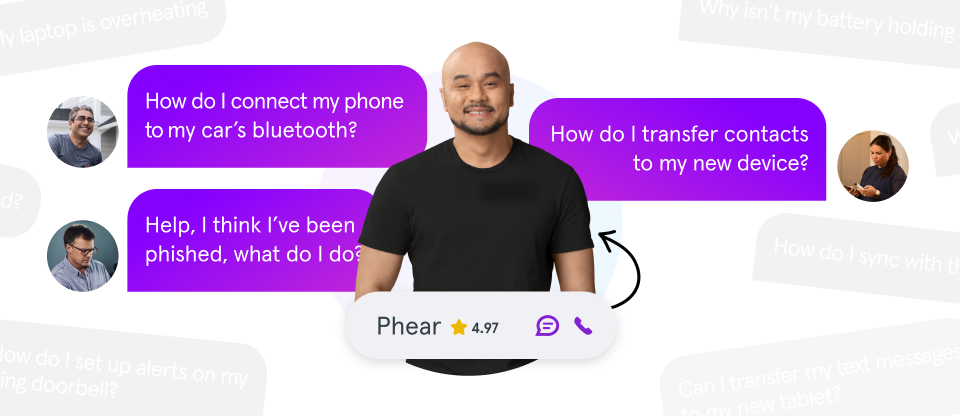If you’ve ever tried to explain secure Wi-Fi to your 65-year-old mom or helped your 87-year-old grandfather change his computer password from “12345”, you know that, sometimes, older people aren’t as familiar with online security as they should be.
The same can be said for younger people, of course. But when it comes to seniors and their tech, financial scams are a growing problem. According to the Federal Bureau of Investigation (FBI) Internet Crime Complaint Center, in 2022, adults over age 60 reported 88,262 complaints, with a total loss of $3.1 billion. That was an 84% increase in losses compared to those reported in 2021. Much of this financial abuse was committed when cyber criminals hacked into or contacted older people through their tech.
At Asurion, our experts help more than 300 million people with their tech care needs, including data security. Here’s our guide on preventing elder fraud and what to do if it happens in your family.
What’s elder fraud?
When criminals—cyber and otherwise—target seniors and steal their personal information, property, or money, that’s elder fraud. They use different methods like phishing scams, where thieves send you emails or texts, pretending to be a company or person you know to steal your bank account login or credit card information, among other things. Sometimes, bad actors simply call their victims on the phone and convince them to share personal information to steal their identities or tap into their accounts.
Why's elder fraud a growing problem?
Scam artists often target older people who have built up substantial assets like retirement accounts, pensions, and savings. Senior citizens—especially those who live alone or have lost a spouse— can be lonely and vulnerable to persuasive scammers, plus thieves may prey on those who are challenged with health problems or memory decline.
In decades past, thieves had to contact people in person or by phone. Now, with greater accessibility of tech in the form of emails, texts, and online ads, it’s easier for criminals to reach more elderly victims. Sadly, this means this problem is on the rise.
Common types of elder fraud
Financial fraud targeting older adults takes many forms, from criminals impersonating a representative from a government agency like the IRS to steal personal information or money, to thieves convincing a grandparent they need to transfer money to bail their grandchild out of jail. Watch out for these increasingly common types of elder fraud:
Investment scams
If a broker or advisor, or someone impersonating a broker or advisor, says an investment has no risk, or if they pressure you into buying something, especially after a major life event like the death of a spouse, it’s likely a poor investment or even a scam. Best to say no.
Trusted person abuse
It’s disturbing, but financial crimes involving elders are usually committed by a friend, caregiver, or family member that an older person trusts. In fact, according to a 2019 review by the federal Consumer Financial Protection Bureau (CFPB), in cases when victims knew the suspected perpetrator, more than two-thirds involved a family member with an average loss of $42,700. To prevent this, make sure that two trusted people—not just one advisor—have access to their accounts and passwords. Or, one person can manage the older person’s accounts as long as they give periodic updates to the rest of the family. Either way, make these arrangements with the older person’s consent and understanding.
Tech support scams
Here’s how they work: a scammer posing as a tech support worker tells you there’s an issue with your computer, then asks for remote access to your device to fix it. Don’t grant them access—they could install malicious software, tamper with your settings, or steal your financial information. Computer manufacturers won’t contact you about software problems or updates.

Don’t waste time scrolling
Life is short. Ask our experts and get answers now.
Warning signs of elder fraud
To help keep an older person safe from fraud, look for these warning signs:
Unsolicited requests for upfront payment or financial documents
Be cautious of unsolicited phone calls, mailings, or house calls, especially when the person or company is asking for immediate payment or financial documents like a tax return or bank statement. Always say no.
Unusual financial decisions made by the older person
If an older person suddenly makes an out-of-character decision— like buying stocks in a company when they’ve never bought stocks previously—it’s time to ask questions.
Suspicious activity or changes in banking behavior
Is the senior suddenly helping a new friend or relative financially? Have you seen large withdrawals from a bank account or investment fund? Respect the older person’s decisions but ask for more information.
How to protect seniors from elder fraud
Here are a few things you can do—and help an older person do—to prevent elder fraud.
Avoid clicking on suspicious links
Never click links or download attachments from a sender you don’t know. Always verify the sender and make sure the message is legit before you do.
Update your software regularly
When you get a reminder to update your operating system, do it. Updating your tech will help protect you from hackers. Better yet, turn on automatic updates. The exact location of this setting depends on your device and platform, but look for it in Settings, then Software Update, System Update, or Update Security.
If you’re not sure about the next steps, here are our guides to updating your iPhone® and Android™, as well as what to do if your iPad® won’t update.
Use secure Wi-Fi networks and VPN connections
To stay safe online, always use a secure, password-protected Wi-Fi network. Need help setting one up? Check out our guide to securing your home network.
For extra security, consider setting up a virtual private network (VPN). It creates a secure, encrypted connection between a device and a remote server, protecting your identity from hackers. Learn more in our VPN guide.
For more ways to protect seniors online, check out our guide for how to stay safe on the internet.
How to help a fraud victim
If an older person you know is the victim of elder fraud, here are some ways to help.
Contact an attorney
If you think an older person has been exploited, you can call or write a letter to Adult Protective Services in your area. An elder law attorney can help. Check out the federal government’s Eldercare Locator to find legal assistance in your area.
Report elder fraud
If you or someone you know has been a victim of elder fraud, call the National Elder Fraud Hotline, 833-FRAUD-11 or 833-372-8311, Monday through Friday, 10am to 6pm.
The hotline is a free resource set up by the U.S. Department of Justice (DOJ) Office for Victims of Crime to report fraud against anyone age 60 or older. When you call, you’ll talk to a case manager who’ll help you through the process and guide you with the next steps.
Tried these steps and still need help? We got you. Get your tech problem solved when you call or chat with an expert now.





